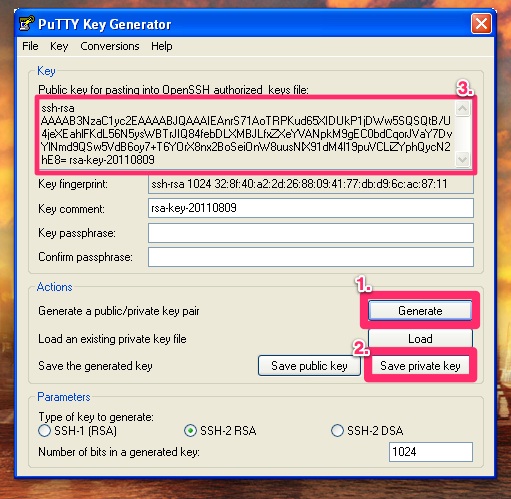
Working with PuTTY's Public Key Format. You can click Save public key as well, but take note: The format PuTTYGen uses when it saves the public key is incompatible with the OpenSSH authorizedkeys files used for SSH key authentication on Linux servers. If you need to see the public key in the right format after the private key has been saved. Under Actions / Generate a public/private key pair, click Generate. You will be instructed to move the mouse cursor around within the PuTTY Key Generator window as a randomizer to generate the private key. Once the key information appears, click Save private key under Actions / Save the generated key. Save the private key to the desktop as id. To install the public key, Log into the server, edit the authorizedkeys file with your favorite editor, and cut-and-paste the public key output by the above command to the authorizedkeys file. Save the file. Configure PuTTY to use your private key file (here keyfile.ppk). Then test if login works. See configuring public key authentication for. Generate SSH Key using PuTTYgen. With PuTTYgen you can generate SSH key pairs (public and private key) that are used by PuTTY to connect to your server from a Windows client. The private key will be stored on your local machine, while the public key has to be uploaded in your dashboard. To generate SSH public and private key pairs on Windows, one of the easiest tools to use, is the PuTTY Key Generator “puttygen.exe” (which can be downloaded from here). The resulting generated files from the PuTTY Key Generator can be used to set up public key authentication with a remote server, allowing for more secure. Dec 01, 2016 putty ssh private + public key windows and linux with puttygen. Securing SSH with Public and Private RSA Keys Using Putty. Generate SSH Key Pairs to Access Linux instances in the Oracle. How to Generate SSH Keys on PuTTY. SSH keys are one of the most secure SSH authentication options. It is definitely more secure than the usual SSH password authentication. Therefore, it is highly recommended to use SSH Key authentication method for connections to your servers.
Ssh Key Generation In Linux
The PuTTYgen program is part of PuTTY, an open source networking client for the Windows platform.

Generate A Public Key With Putty Free
Putty Key Location
- Download and install PuTTY or PuTTYgen.
To download PuTTY or PuTTYgen, go to http://www.putty.org/ and click the You can download PuTTY here link.
- Run the PuTTYgen program.
- Set the Type of key to generate option to SSH-2 RSA.
- In the Number of bits in a generated key box, enter 2048.
- Click Generate to generate a public/private key pair.
As the key is being generated, move the mouse around the blank area as directed.
- (Optional) Enter a passphrase for the private key in the Key passphrase box and reenter it in the Confirm passphrase box.
Generate ecpair fromwif public key. Note:
While a passphrase is not required, you should specify one as a security measure to protect the private key from unauthorized use. When you specify a passphrase, a user must enter the passphrase every time the private key is used.
- Click Save private key to save the private key to a file. To adhere to file-naming conventions, you should give the private key file an extension of
.ppk(PuTTY private key).Note:
The.ppkfile extension indicates that the private key is in PuTTY's proprietary format. You must use a key of this format when using PuTTY as your SSH client. It cannot be used with other SSH client tools. Refer to the PuTTY documentation to convert a private key in this format to a different format. - Select all of the characters in the Public key for pasting into OpenSSH authorized_keys file box.
Make sure you select all the characters, not just the ones you can see in the narrow window. If a scroll bar is next to the characters, you aren't seeing all the characters.
- Right-click somewhere in the selected text and select Copy from the menu.
- Open a text editor and paste the characters, just as you copied them. Start at the first character in the text editor, and do not insert any line breaks.
- Save the text file in the same folder where you saved the private key, using the
.pubextension to indicate that the file contains a public key. - If you or others are going to use an SSH client that requires the OpenSSH format for private keys (such as the
sshutility on Linux), export the private key:- On the Conversions menu, choose Export OpenSSH key.
- Save the private key in OpenSSH format in the same folder where you saved the private key in
.ppkformat, using an extension such as.opensshto indicate the file's content.